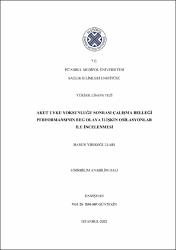| dc.contributor.author | Yırıkoğulları, Harun | |
| dc.date.accessioned | 2023-10-12T06:12:00Z | |
| dc.date.available | 2023-10-12T06:12:00Z | |
| dc.date.issued | 2022 | en_US |
| dc.date.submitted | 2022-07-22 | |
| dc.identifier.citation | Yırıkoğulları, H. (2022). Akut uyku yoksunluğu sonrası çalışma belleği performansının eeg olaya ilişkin osilasyonlar ile incelenmesi. (Yayımlanmamış yüksek lisans tezi). İstanbul Medipol Üniversitesi Sağlık Bilimleri Enstitüsü, İstanbul. | en_US |
| dc.identifier.uri | https://tez.yok.gov.tr/UlusalTezMerkezi/tezSorguSonucYeni.jsp | |
| dc.identifier.uri | https://hdl.handle.net/20.500.12511/11564 | |
| dc.description.abstract | Çalışma belleği (ÇB); hedefe yönelik davranışın gerçekleştirilmesinde yeni bilginin öğrenilmesi, korunması ve manipüle edilmesini gerektiren sınırlı kapasiteli bir sistemdir ve uyku yoksunluğunun etkilediği temel kognitif fonksiyonlardan biridir. Bu çalışmada ise, 24 saat total uykusuzluğun çalışma belleği üzerindeki etkileri olaya ilişkin beyin salınımları ile incelenmiştir. Araştırmaya iyi uyku kalitesine sahip 30 sağlıklı genç yetişkin katılımcı (15 kontrol, 15 uyku yoksunu) dahil edilmiştir. Uyku yoksunu katılımcılar, bir gece boyunca hiçbir uyarıcı tüketmeden uyanık kalmışlar, kontrol grubu ise normal uyku sürelerinde uyumuşlardır. ÇB görevi esnasında EEG oturumu gerçekleştirilmiştir. Çalışma belleğinin değerlendirilmesi için sözel ve görsel-mekansal 2-geri görevi kullanılmıştır. Başarı oranları ve reaksiyon süreleri her iki grup için incelenerek karşılaştırılmıştır. Görev esnasında fronto-santral, temporo-parietal ve parieto-oksipital bölgelerde açığa çıkan olaya ilişkin delta, teta ve alfa yanıtları zaman-frekans analizleriyle incelenmiştir. Sonuçlarda, uykusuz grubun uykululuk skorları kontrol grubundan yüksek bulundu. Sözel 2-geri görevinde 24 saat uykusuz grubun isabetli yanıt oranları kontrol grubuna göre azalmış, reaksiyon süreleri ise her iki görev türünde uzamıştır. EEG analizlerinde göre, sözel 2-geri görevi esnasında fronto-santral bölgede açığa çıkan olaya ilişkin delta ve teta yanıtları uyku yoksunu grupta azalmıştır. Ayrıca, teta ve parieto-oksipital alfa faz kilitlenmeleri uyku yoksunu grupta azalmıştır. Elde edilen bulgular doğrultusunda, uyku yoksunluğunun dikkat süreçlerini olumsuz etkilediği, böylece hem çalışma belleği performansında hem de fronto-santral ve parieto-oksipital bölgede çalışma belleğine ilişkin osilatör yanıtlar üzerinde bozucu etkisi olduğu anlaşılmaktadır. | en_US |
| dc.description.abstract | Working memory (WM) is a limited-capacity system that requires learning, maintaining, and manipulating new information to initiate goal-directed behaviors. WM is one of the main cognitive functions that can easily influence by sleep deprivation. During this study, the consequences of 24-hour total sleep deprivation on working memory were investigated by event-related brain oscillations. The study included thirty healthy young adults (15 sleep-rested, 15 sleep-deprived) with good sleep quality. In the sleep-deprived condition, the subjects were required to stay awake one night without consuming any stimulant. In the sleep-rested condition, subjects normally slept at night. EEG sessions were conducted during the WM task. Verbal and visuo-spatial 2-back tasks were used to assess the WM performance. Accuracy and reaction times were examined and compared between groups. The event-related delta, theta, and alpha oscillations were investigated in the fronto-central, temporo-parietal and parieto-occipital regions by time-frequency analysis. We found that sleepiness scores of the sleep-deprived group were higher than the control group. In the verbal 2-back task, accurate responses of the 24-hour sleep-deprived group were decreased compared to the control group, and the reaction times were increased for both tasks. According to EEG analysis, the sleep-deprived group showed reduced event-related delta and theta responses in the fronto-central region during the presentation of verbal stimuli. Besides, the theta and alpha phase-locking was reduced in sleep-deprived group. Following the results, sleep deprivation negatively affects attentional processes, thus impairing working memory performance and oscillatory responses related to WM in the fronto-central and parieto-occipital regions. | en_US |
| dc.language.iso | eng | en_US |
| dc.publisher | İstanbul Medipol Üniversitesi, Sağlık Bilimleri Enstitüsü | en_US |
| dc.rights | info:eu-repo/semantics/openAccess | en_US |
| dc.subject | Beyin Osilasyonları | en_US |
| dc.subject | Çalışma Belleği | en_US |
| dc.subject | Dikkat | en_US |
| dc.subject | EEG | en_US |
| dc.subject | Uyku Yoksunluğu | en_US |
| dc.subject | Brain Oscillations | en_US |
| dc.subject | Working Memory | en_US |
| dc.subject | Attention | en_US |
| dc.subject | EEG | en_US |
| dc.subject | Sleep Deprivation | en_US |
| dc.title | Akut uyku yoksunluğu sonrası çalışma belleği performansının eeg olaya ilişkin osilasyonlar ile incelenmesi | en_US |
| dc.title.alternative | The investigation of working memory performance after acute sleep deprivation by eeg event-related oscillations | en_US |
| dc.type | masterThesis | en_US |
| dc.department | İstanbul Medipol Üniversitesi, Sağlık Bilimleri Enstitüsü, Sinirbilim Ana Bilim Dalı | en_US |
| dc.relation.publicationcategory | Tez | en_US |
| dc.institutionauthor | Yırıkoğulları, Harun | |


















